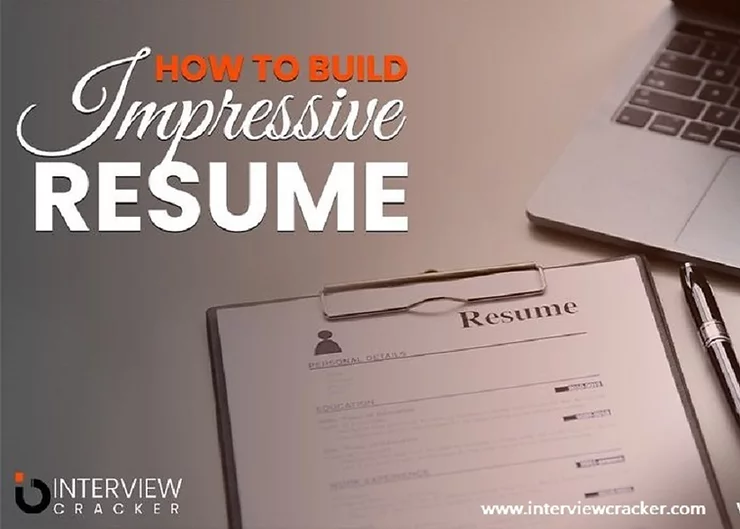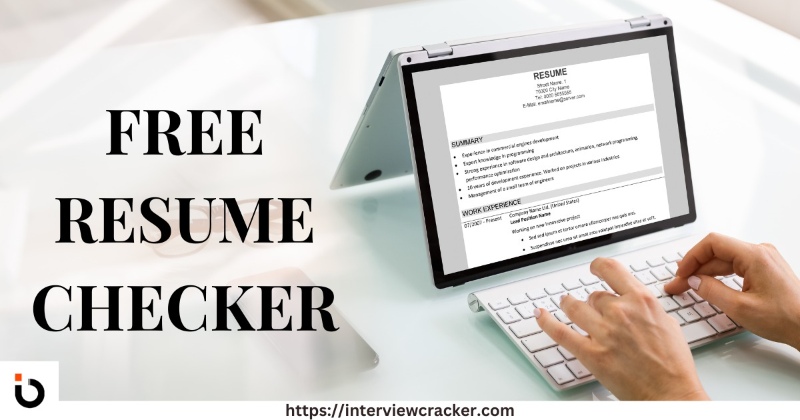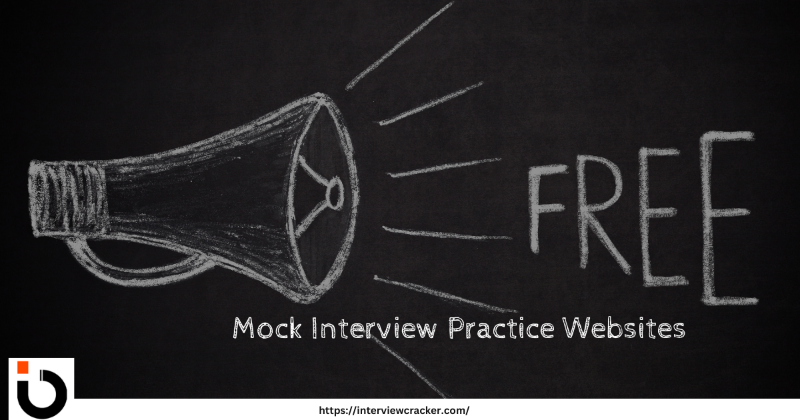What is Resume?
Resumes are what you present before your hiring managers to introduce yourself. Resumes provide answers to some of the basic questions that define you.
Resumes are typically used by job seekers when applying for employment opportunities, internships, or academic programs. The primary goal of a resume is to give your employer a clear idea, whom they are going to meet.
A Perfect Resume
A perfect resume intercedes for you while applying for a job. It speaks to the hiring managers about your achievements, career, academics, and who and what you are.
A step- by -step process, how to create a resume.
What are the Purpose of Resume?
The purpose of a resume is to provide an impression of you before the interviewer meets you. The objective of a resume is a concise and well-organized summary of a person’s skills, qualifications, education, work experience, and accomplishments.
10 main objectives of a resume are as follows:
- First Impression: A resume serves as an initial introduction to potential employers or recruiters. Remember, First impression is the last impression. It is the first impression they have of you as a candidate, so it should be well-crafted and professional.
- Showcasing Relevant Skills and Qualifications: Resumes highlight your skills, qualifications, and relevant experiences that align with the specific job or position you are applying for. It helps employers quickly identify if you possess the necessary competencies for the role.
- Employer’s Decision-Making: Employers often receive numerous applications for a single position. A well-structured resume allows them to easily compare applicants and shortlist candidates for further consideration.
- Demonstrate Career Progression: Your resume should demonstrate the progression of your career and showcase any advancements or promotions you have achieved throughout your professional life.
- Academic and Professional Achievements: Resumes provide an opportunity to highlight any notable academic achievements, certifications, awards, or recognition you have received.
- Contact Information: It includes your contact information (phone number, email address, and sometimes a LinkedIn profile link) to allow employers to reach out to you for further communication or interviews.
- Customization: Resumes can be tailored to specific job applications, allowing you to emphasize certain skills and experiences that are particularly relevant to the position you are seeking.
- Digital Presence: In today’s digital age, resumes often serve as the basis for online profiles, such as LinkedIn, which are widely used by employers and recruiters for candidate searches. Suggested Read: How to create LinkedIn Resume
- Assessment of Cultural Fit: Depending on how a resume is written and presented, employers may gain some insight into whether a candidate would be a good fit for their company culture.
- Application Requirement: In many cases, submitting a resume is a standard requirement for job applications, making it a necessary document in the job search process.
Remember that a resume should be clear, concise, and tailored to the specific job you are applying for. It should effectively highlight your most relevant skills and experiences to increase your chances of landing an interview.
Objective Section of a Resume
The objective section is a concise statement that outlines your career goals and highlights what you can offer to the company. It’s usually placed at the top of the resume, under your contact information.
Example of a Resume Objective
- For a Fresher
“Motivated marketing graduate seeking an entry-level position to apply strong analytical skills and creativity to support the team’s marketing initiatives.” - For a Career Switcher
“Experienced teacher transitioning into instructional design, eager to leverage educational expertise and technology skills to create impactful learning materials.” - For an Experienced Professional
“Results-oriented sales manager with over 10 years of experience in increasing revenue and team performance, looking to drive growth at XYZ Corporation.” - For a Tech Position
“Detail-oriented software developer skilled in Python and Java, eager to deliver innovative solutions and contribute to the company’s technological advancements.” - For Customer Service
“Customer-focused professional with a proven track record of resolving client issues efficiently, seeking to enhance the customer experience at ABC Ltd.”
The objective should always align with the job role you’re applying for, ensuring relevance and clarity. For more personalized examples, tailor your skills and aspirations to match the specific job description.
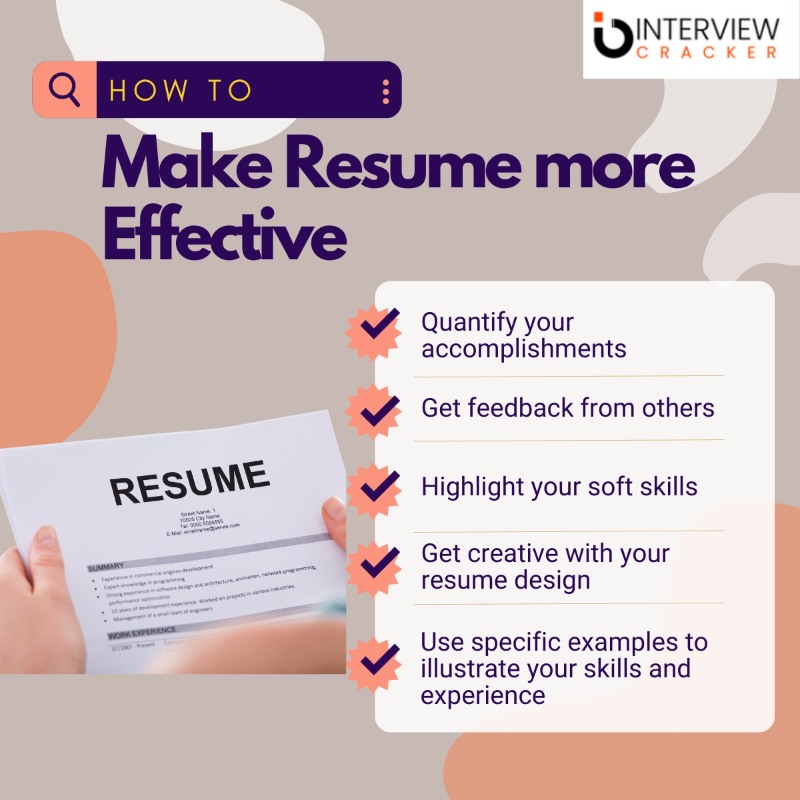
10 Importance of Resume in Applying a Job | Importance of Resume
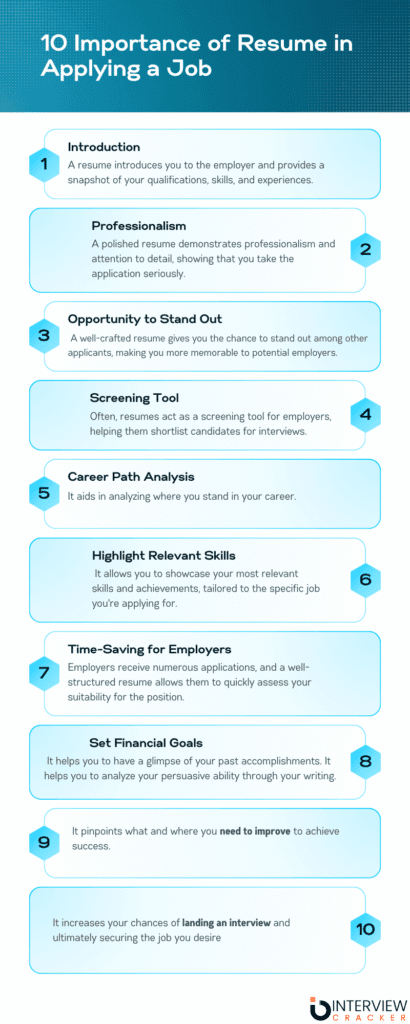
Resumes help you not only to impress your employers but it has other advantages as well. Listed are 10 points to know why resume is important.
- Introduction: A resume introduces you to the employer and provides a snapshot of your qualifications, skills, and experiences.
- Professionalism: A polished resume demonstrates professionalism and attention to detail, showing that you take the application seriously.
- Opportunity to Stand Out: A well-crafted resume gives you the chance to stand out among other applicants, making you more memorable to potential employers.
- Screening Tool: Often, resumes act as a screening tool for employers, helping them shortlist candidates for interviews.
- Career Path Analysis: It aids in analyzing where you stand in your career.
- Highlight Relevant Skills: It allows you to showcase your most relevant skills and achievements, tailored to the specific job you’re applying for.
- Time-Saving for Employers: Employers receive numerous applications, and a well-structured resume allows them to quickly assess your suitability for the position.
- Past Accomplishments: It helps you to have a glimpse of your past accomplishments. It helps you to analyze your persuasive ability through your writing.
- It pinpoints what and where you need to improve to achieve success.
- It increases your chances of landing an interview and ultimately securing the job you desire
So, through your short story, you will gain an understanding of yourself. These are a few advantages of a resume for job application.
How to Write a Resume?
- Provide a cover letter thanking the company for reaching out to you or considering your job application. It gives a good impression of you.
- Your employers do not spend more than a minute reading your resume. They just skim through it and frame the initial questions for your interview. The skills required for enrolling in their company are what they look for in a resume. So it is mandatory for any candidate to have a thorough understanding of the company before they frame a resume.
- You have the absolute right to write your resume. So structure it favouring yourselves. Go through the job description to achieve this. Think of how you can contribute to the success of the company. A brilliantly structured answer can impress your employers. But make sure you do not include any fake achievements or details. It lands you in trouble and will forever remain a black spot in your profile.
- Rather than boasting about your skills, try to prove your credibility. This is what employers need because nobody knows whether what you have written in your resume is true or not.
- Focus on your achievements and experience. Those who have zero experience in the required field can mention the internships you have done before. This is why students are encouraged and advised to go for internships along with their studies. Internships can help you achieve a lot. How to make an Internship Resume
- A short and crisp resume revealing your entire self attracts employers rather than a lengthy one. Understand that the mile-long resume cannot fix your future hence the purpose of resume is to create a strong impression.
- Make mention of why you are applying for a particular post. This is a very important question that could be asked for the interview as well.
How to Make Resume Effective?
To make a resume more effective you need to focus on these 5 things:
- Quantify your accomplishments
- Get feedback from others
- Highlight your soft skills
- Get creative with your resume design
- Use specific examples to illustrate your skills and experience.
Conclusion
A well-crafted resume is not just a list of experiences but a strategic representation of an individual’s professional identity. By recognizing the importance of tailoring, concise presentation, and showcasing achievements, job seekers can make their resumes shine and maximize their chances of landing their dream job.
Also read: How to face an interview – 7 Important tips & tricks
FAQs on "The Purpose of a Resume" What is the main purpose of a resume?
A resume’s main purpose is to present a concise overview of your skills, experiences, and qualifications to potential employers, helping them assess your fit for a job.
Why is a resume objective important?
The resume objective provides a snapshot of your career goals and the value you bring to the employer, helping to immediately capture the hiring manager’s attention.
What are the key components of an effective resume?
An effective resume includes a professional summary, work experience, education, skills, and achievements tailored to the specific job.
How should a resume objective differ for different industries?
Resume objectives should be customized based on the industry and job role, focusing on specific skills and goals relevant to that field
Can a resume objective help someone switching careers?
Yes, a resume objective can highlight transferable skills and clarify your goals when transitioning to a new industry or job role.
Should a fresher include a resume objective?
For freshers, a resume objective can outline career aspirations and relevant skills, compensating for the lack of work experience.
What is the difference between a resume and a CV?
A resume is a concise document tailored for specific job applications, while a CV is a detailed academic and professional history often used in academia or research.
Suggested Read: Difference between CV and Resume
Do all resumes need an objective?
Not all resumes require an objective. Experienced professionals often replace it with a summary of qualifications or a professional profile.

